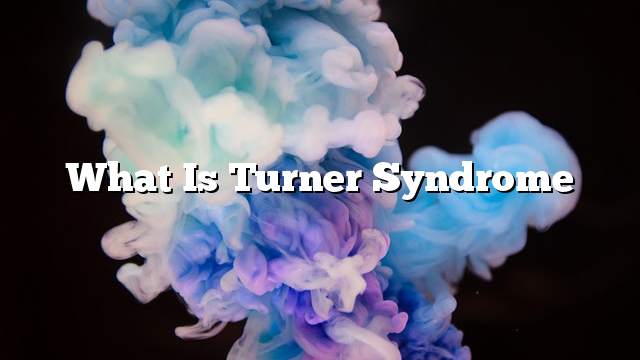Turner syndrome
Turner Syndrome is a disorder caused by the loss or absence of sexual chromosomes, X chromosomes, which causes physical and mental development disorders. This syndrome occurs in the rate of one of the 2,500 births in the world and is more common in pregnancies that are not fully completed, Such as abortions and stillbirths, which is the birth of a dead child after or during the entire pregnancy period.
Causes of Turner Syndrome
- The total loss of one copy of the X chromosome due to a defect in the sperm of the father or the mother’s egg causes all cells of the body to contain only one copy of the same chromosome in the so-called monochromosome.
- An imbalance in the process of cellular division in the early stages of development of the fetus, causing the presence of cells and mono-chromosome X and other cells with two copies of the so-called mosaic pattern.
- The presence of a part of the Y chromosome is associated with a copy of the X chromosome, although this is rare, but it causes the healthy biological growth of the female.
Symptoms of Turner syndrome
General symptoms
- The neck is short and contains leather folds ranging from the top of the shoulders to the edges of the neck.
- Lower the hair line from the back area.
- Low ears.
- Swelling in the upper and lower limbs.
Symptoms at birth or during lactation
- Lower the lower jaw.
- Lower ears.
- Short length of fingers of upper and lower limbs.
- Low eyelids.
- Swelling of upper and lower limbs.
- Delayed growth.
- Lack of height beyond normal limits.
- Turn the nail toward the top.
Symptoms during puberty
- Palace of length.
- Learning disorders.
- Disorders in social communication.
- Early period break.
- Infertility.
- The absence of sexual signs associated with this stage; due to ovarian immaturity.
Turner syndrome complications
- Congenital heart defects.
- Hearing impairment or loss of hearing.
- Increased risk of cardiovascular disease.
- High blood pressure is normal.
- Infections in the urinary tract.
- Tinnitus or hyperopia.
- Infectious disorders, such as thyroid dysfunction and abdominal disease.
- Weak tooth growth.
- Osteoporosis.
- Injury to the abnormal curvature of the spine, known as dengue.
- Increased risk of mental disorders, such as depression, anxiety and stress.
Treatment of Turner syndrome
- Give growth hormone to increase the height to the maximum possible length and appropriate for the age of the infected female.
- Give estrogen to promote puberty and develop sexual signs in the 12 to 15 year age group.
Coexistence with Turner syndrome
- Maintain the ideal weight by adhering to a healthy lifestyle.
- Conduct periodic checkups on cardiovascular health, especially in patients with congenital heart defects.
